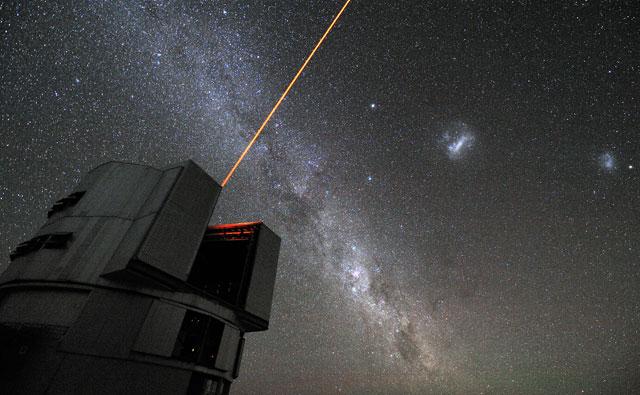Science
Related: About this forumMove over, Hubble. This sharp pic of Neptune was taken from Earth
Cancelling out blur from Earth’s atmosphere lets astronomers focus like never before
BY LISA GROSSMAN 6:00AM, JULY 18, 2018

SHARP EYES A new strategy at the Very Large Telescope in Chile lets the ground-based observatory take visible light images of Neptune (left) that rival those from the Hubble Space Telescope (right) in clarity.
ESO, P. WEILBACHER/AIP, ESO, NASA, ESA, M.H. WONG AND J. TOLLEFSON/UC BERKELEY
A telescope on Earth has snapped pictures of Neptune at least as clear as those from the Hubble Space Telescope. The trick? Taking the twinkle out of stars.
Released by the European Southern Observatory on July 18, the images come from a new observing system on the Very Large Telescope in Chile. The instrument uses four lasers to cancel out blurring caused by Earth’s atmosphere — the same effect that makes it look like stars are twinkling — at different altitudes.
The system is an updated version of adaptive optics (SN: 6/14/03, p. 373), a technique astronomers have long used to focus telescopes. Lasers create artificial “stars” whose size and brightness are precisely known. That gives scientists a way to measure how the atmosphere is distorting their view of real, faraway stars at any given moment. Small motors then change the shape of the telescope’s mirror in real time to correct for that distortion and see the sky as it really is.
The resulting images from the Chilean telescope are as sharp and clear as those taken from space. That’s good news, as Hubble won’t last forever, and planned future space telescopes won’t take images in the visible part of the light spectrum (SN: 3/17/18, p. 4). With adaptive optics, telescopes on the ground can pick up where Hubble leaves off.
More:
https://www.sciencenews.org/article/move-over-hubble-sharp-pic-neptune-was-taken-earth

Hooray for the Very Large Telescope. More images at: https://tinyurl.com/ycph7868
Crutchez_CuiBono
(7,725 posts)at that color! Blues and pink and white.
Auggie
(31,153 posts)Duppers
(28,117 posts)🙏
Judi Lynn
(160,503 posts)20 JULY 2018
A beefed-up telescope promises much-improved images for astronomers. Andrew Masterson reports.

A new optics system fitted to the European Southern Observatory’s Very Large Telescope (VLT) in Chile’s Atacama Desert has gone into operation, producing images as crisp, its operators say, as those produced by NASA’s Hubble Space Telescope.
The new system (dubbed, a little clumsily, GALACSI) uses a method known as laser tomography. The method deploys a number of high-powered lasers, aiming them into the sky to create what could be described as simulated guide-stars.
By measuring these it is possible to calculate to a high degree of accuracy the amount of turbulence and interference present in the Earth’s atmosphere above the telescope. This can then be corrected during the image processing stage, producing pictures with far greater clarity than those obtained by other earth-bound observatories.
A similar system is being built into the Australian National University’s Giant Magellan Telescope (GMT), currently being constructed on the summit of a mountain called Las Campanas, also in Chile. The GMT is expected to be operational by 2020.
More:
https://cosmosmagazine.com/space/neptune-as-you-ve-never-seen-it